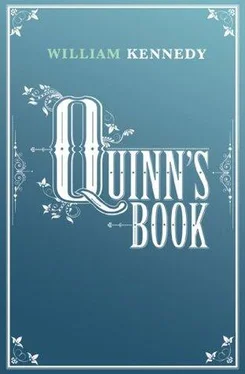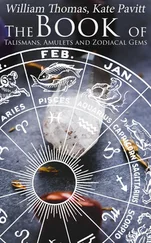In replenishing his vision of it all, Quinn sought not what was new but what was not: the elusive thing that endured unchanged in spite of growth. He tethered his horse in the front carriageway and knocked at the portal of first entrance, the carved wooden door looming before him with the same majesty it owned on the night he arrived a fugitive from the wild river. He stood on the same spot where he had stood then, feeling the strength of ritual rise in him. Repetition of past gestures suddenly seemed to hold the secret of his restoration to. . to what? He could not say. He would not repeat a single day of the known past, would he? Would he willingly relive the days in which Maud was revealed to him, full knowing that the brink of that ecstasy gave onto a chasm of loss and waste? He had kissed Maud and known love, and then descended from beauty into the valley of putrefaction, where lay a generation of blasted sons: seven thousand dead in a single battle, dead in a great wedge of slaughter, their brains and bowels blown out of them, and they then left to rot on a field consecrated by national treachery and endemic madness. And the killing moved on to greener pastures.
The front door opened and Quinn recognized Capricorn, hair gone to white, skin gone to leather, eyes waning. The old man did not recognize the long, lean Quinn in his soldier’s shirt (he was not a soldier), his riding breeches and boots, and the wide-brimmed slouch hat beneath which he had lived so long. But when Quinn took off the hat to reveal dense waves of hair the color of earth, then the old man’s eyes remembered history.
“You’re Mist’ Quinn.”
“Cappy, you’ve kept your wits intact, unlike most of us.”
Quinn entered a house refurnished: gone the cherrywood sofa on which the widow Ryan and her terrified children had sat, replaced by a resplendently huge oval settee; gone the music-room portraits of Petrus and Hillegond, the walls covered now with huge tapestries; gone, too, the foyer’s Dutch colonial chandelier, and pendulous now in its place one of crystal, twice the size of the old one and exuding thrice the former elegance. This place does not shrink in memory. It waxes in breadth, and its opulence thickens.
“Is Dirck home?” Quinn asked.
“No more. He marry that singer and he move to Sweden. That’s where he live now.”
“Sweden. I remember his wife always wanted to go back there.”
“Said he didn’t wanna be here no more. Sold the house to Mr. Fitzgibbon and went away.”
“Sold the house? What about Hillegond?”
“Mist’ Quinn, Miss Hilly’s gone.”
“Gone where?”
“Gone. Killed. They strangle her. Wire her neck. They say she musta died right off.”
Quinn took off his hat, ran his hand through his hair, falling into the void, groping for a word.
“When?”
“Last Feb’ary sometime. Six months now. Worst thing ever happen in this house.” Capricorn sighed mightily and his voice broke. “They do my Matty too. Killin’ women like that.”
“Who did? Why? What is all this?”
“Don’t really know. Some thinks they knows. But nobody knows why they do my Matty too.”
Capricorn was near tears, and Quinn motioned the old man toward the east parlor.
“Can we sit and talk about this?”
“Capricorn don’t sit in there. New butler, he don’ allow that.”
“A new butler. Everything’s changed. What about the porch?”
“Don’ think so.”
“We won’t go to the kitchen. All right if we walk?”
“Walkin’ is fine.”
And so they walked on the road under a relentless sun, with Capricorn immediately talking of the great wealth of the new owner, Gordon Fitzgibbon, son of Lyman, and passing on then to Hillegond. Sadness smothered Quinn with each vision of her that came into his memory, and he knew he would have to turn the conversation away from her. He would find out the details of her murder from Will Canaday, read all the stories Will must have written about it. Quinn could drown in such evil but he would not. He would survive Hillegond’s death as he had others in the war: move past them; control the power of grief and anger to destroy the vessel. But he could feel the impetus for control weakening with each new death that touched him, his survival drive waning like Cappy’s eyesight. Soon there may be no drive.
And Capricorn talked on.
“This woman, she open her house to colored folks. She feed them, help them go to freedom. She save Joshua from jail, then give him money so’s he can bring other coloreds up from Carolina. Joshua’s woman stop here too. Miss Hilly a sainted lady. She in heaven for sure. She be a queen up there.”
“I was here the night Joshua came in as a prisoner, manacled to the Swede,” Quinn said.
“I recollect.”
“After that I asked you about him, but you wouldn’t tell me anything.”
“I recollect that too.”
“I saw Joshua in New York.”
“We ain’t seen him here. How that boy doin’?”
“Long time ago, but he was all right then.” Quinn the liar.
“Aw, that’s fine.”
“He was working in John McGee’s saloon. You remember John? The fighter? John the Brawn they called him.”
“Nobody forget that man once they meet him.”
“Joshua had a new name first time I caught up with him. Called himself Mick the Rat.”
“Go on. Mick the Rat?”
“That’s it. He was handling rats for John.”
“Handlin’ rats?”
“A special show to bring people into the saloon. They see the rat show free, then maybe they drink and gamble some. Joshua had a bag full of rats. He’d catch a fresh bunch every night at the slaughterhouse. Throw a light on them and while they stared at it he’d grab ’em with long pincers and drop ’em in the bag.”
Capricorn shook his head. “Joshua do that? Joshua?”
Quinn nodded. “Then he’d bring the rats into John’s place and put one into this pit in the back of the saloon. People all around the pit watching, and then somebody’d put a bull terrier in with the rat. Terrier’d kill it quick. Then Joshua’d put two rats in and the terrier’d kill them too, sometimes just one bite apiece. Then they’d put a Mexican hairless in and Joshua’d dump in four rats and the Mex’d get them all. Then five rats, then six. The rats had no chance. It was a matter of time.”
“Can’t say as I like that game.”
“No. But Joshua needed money. He was hiding two fugitive slaves and trying to move them north.”
“He always doin’ that.”
“Asked me to help him. He didn’t really know me, but he trusted me. Said that was his talent, knowing if he could trust you.”
Joshua told Quinn the bounty on one of the runaways was three hundred dollars, which made his work of hiding the pair doubly difficult. The second slave had no price on his head, being possessed of only one eye, the other destroyed by the lash of a whip from his master’s hand, marking him as an evil-eyed source of ill luck to all. Joshua had led the slaves from Philadelphia to a farmer’s cabin south of Kingston that was only marginally secure; and when he learned the slave hunters were closing in he put the problem to Quinn: We need a white man. Quinn said he was a white man.
Joshua had allies, but the known local abolitionists were of no value in this situation. Quinn, a stranger, could bring the necessary word to the inns and the grogshops where the deadliest gossip thrived and where the slave hunters had been biding their time to hear it. The slavers were also a pair, not from the South (by their accent) but Yorkers, clearly. They came equipped: ropes, manacles, rifles, pistols, money to loosen tongues. They called each other by name — Fletch and Blue — and made no secret of their ambition: “Catch niggers.”
Читать дальше












